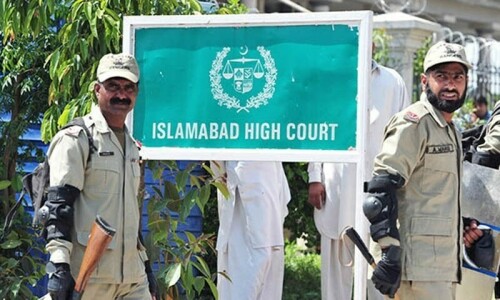On the day the National Assembly called upon the Organisation of Islamic Cooperation to take “effective action” against the Israeli attack on Gaza, the 57-member body’s secretary general did some plain-speaking, admitting that the Arab component of the Muslim world could do little to stop the Israeli state from destroying Gaza.
The lawmakers’ speeches contained little beyond emotionalism, and the unanimous resolution passed in Monday’s sessions called for an “emergency session” of the OIC to stop “Israeli brutality against innocent civilians forthwith”.
Not far from Parliament House, Iyad Ameen Abdullah Madani showed a lot of realism in his speech to the Institute of Strategic Studies, referred to the loss of the West Bank, Sinai, Gaza and the Golan Heights in the 1967 war and said there was nothing the Arabs could do “practically” to confront Israel.
The OIC wanted to press war crimes charges against Israel, but, said Mr Madani, “preachers of human rights” were not only supporting Israel but serving as a “political shield” for the Jewish state. Mr Madani, however, claimed, and not unjustifiably, that the OIC had played a positive role in issues concerning Muslims in Myanmar and the Central African Republic.
It is, however, Mr Madani’s views on what ails the Muslim world that deserve attention and analysis. That the current scene in the Muslim world is dominated by debilitating internal conflicts stemming from extremism and sectarianism is obvious.
From Pakistan through the Fertile Crescent to the Maghreb and the Sub-Saharan region, the Muslim world is witnessing one of its history’s greatest ideological conflicts which have turned such countries as Iraq and Syria into one big charnel house.
An end to the fratricide doesn’t seem in sight, because well-armed militias with motivated cadres have weakened state authority by occupying large chunks of territory but are themselves unable to acquire the status of de facto governments.
This has added to mass misery, forcing the people to go looking for the basic necessities of life during anarchy. The point to note, however, is that even when this anarchy was absent — as when powerful dictators gave phony stability to their states — the Muslim world’s collective voice didn’t count for much owing to the absence of some of the basic elements of geopolitical power.
Because of clashing national interests, it was not possible for OIC states to have a collective security system, but at least the organisation could have fostered closer collaboration in science and technology. Such cooperation was feasible, if the OIC had drawn up a comprehensive plan for active collaboration between oil-rich countries and those with a pool of scientific manpower.
What Muslim countries need today is internal peace and democracy in which to organise their societies along scientific lines to give the Muslim peoples the tools to face the social and political challenges confronting them.
Published in Dawn, Aug 6th, 2014








































